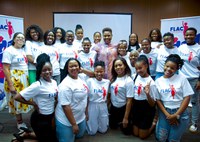STATUS OF THE YOUTH ADDRESS: Amplifying voices and influencing change
However, as we commemorate this historic event, it is imperative that we acknowledge the pressing issues our youth face today and take action with the same conviction as those heroes of 1976.
While many of us wear uniforms to remember and celebrate June 16 and the events of 1976, we often fail to fully comprehend the challenges at hand and neglect to act with the same determination shown by the youth of '76 in dismantling the systems that still oppress many of us today, nearly half a century later. The courage the youth of 1976 displayed in refusing to be taught in Afrikaans was symbolic of their mission to dismantle the antiapartheid system.
South Africa is a nation filled with youthful energy, with a significant portion of its population aged 15 to 34. These young individuals find themselves on the frontlines of numerous systemic challenges, including unemployment, gender inequality, barriers to education, climate injustice, and exclusion based on disability and nationality. They carry the burden of social ills that impede their progress and limit their opportunities. Despite their resilience and relentless efforts to bring about change, they continue to face disempowering obstacles in our 29-year-old democracy.
The events of June 16, 1976, and subsequent movements like #FeesMustFall and #TotalShutDown have showcased the transformative power of youth activism. The torch of change has been passed down through generations, yet the struggle persists. The youth of 2023 stand at a crucial juncture, fighting against deeply rooted systems that deny them the benefits of the hard-fought freedom their predecessors valiantly achieved.
At the Soul City Institute for Social Justice, we are committed to partnering with young people to create a world that aligns with their aspirations. For nearly three decades, we have embarked on groundbreaking projects addressing South African youth's diverse needs and experiences. Their plight continues to inspire us, and it is their dreams that propel our work forward. However, the disheartening statistics of rising youth suicides and the prevalence of depression among university students underscore the profound disillusionment many young South Africans feel toward their country.
If we are to nurture and empower our youth, we must prioritise their access to physical, mental, and sexual health resources. By investing in their well-being, we invest in the future of our nation. We must recognise that young people are not merely torchbearers of tomorrow; they are active participants in the present, grappling with the realities of race, class, gender, sexuality, disability, and nationality. Their voices hold weight, and we must create spaces where they can be heard, understood, and supported.
Today's youth are not just the future; they are alive and affected by the challenges of our time. It is crucial that they do not lose hope but instead harness their collective power, along with the influence of the media and their preferred social media platforms, to address the injustices, exclusions, discrimination, and human rights violations they face. By taking collective action and mobilising for change in schools and other spaces they occupy, we can witness an intentional movement of youth rising to challenge the status quo, especially with an upcoming election year on the horizon.
As we celebrate Youth Day, the Soul City Institute extends revolutionary, and feminist well wishes to all young South Africans. May this be a Youth Day that sparks transformative change. Let it serve as a reminder of the immense potential within each of you to effect positive and lasting change. Stand together, mobilise, and challenge the systemic barriers that hinder your progress.

